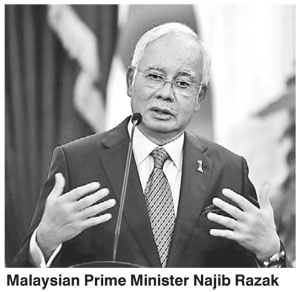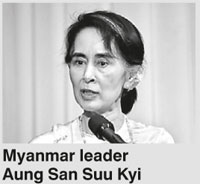Thursday Mar 05, 2026
Thursday Mar 05, 2026
Saturday, 10 December 2016 01:04 - - {{hitsCtrl.values.hits}}
Reuters: Malaysian Prime Minister Najib Razak’s stern rebuke to Myanmar for a military-led crackdown on Muslim Rohingyas was a rarity among Southeast Asian nations, who adhere to a policy of non-interference in each other’s domestic affairs.
Critics saw the beleaguered Najib reaching for the moral high ground with his criticism over the weekend of Myanmar in order to pander to Malay Muslim voters after a series of protests calling for him to resign over a corruption scandal.
Najib is eyeing elections in the second half of 2017, nearly a year ahead of the 2018 deadline, a government source told Reuters.
At a rally on Sunday, Najib called for foreign intervention to stop the “genocide” of Rohingya Muslims and lashed out at Nobel laureate Aung San Suu Kyi for her inaction.
The persecution of the Rohingyas in Rakhine state, however, has been going on for years. It has forced hundreds of thousands to board flimsy boats and flee to neighbouring countries including Malaysia, Thailand and Indonesia - which along with Myanmar are all members of the Association of Southeast Asian Nations (ASEAN).
More than 100,000 Rohingya live in poverty and face harassment as illegal migrants in Malaysia. Many others fell into the hands of human traffickers on their perilous journeys from Myanmar.
The Myanmar government was incensed by Najib’s criticism.
Presidential spokesman Zaw Htay said Myanmar was considering lodging an official complaint with ASEAN, the bloc of 10 Southeast Asian nations that agree on economic cooperation but pledge non-interference in each other’s domestic issues.
“He (Najib) could have tried to handle this issue diplomatically through the ambassadors,” Zaw Htay was quoted telling the local media in Myanmar. He accused Najib of looking to win popular support among his Muslim voters.
Myanmar said this week it was halting workers going to Malaysia in response to the comments.
But Najib in his rally speech suggested that ASEAN must set aside its principle of non-interference to tackle regional issues like the Rohingya repressions and migrations, especially when they pose questions about universal values.
“We want to remind Myanmar’s government that the ASEAN charter also upholds basic human rights,” the premier said in his speech.
Rohingyas in Malaysia applauded Najib’s intervention.
“Rohingya people are hoping something may change in Myanmar - and also in Malaysia where many of us live,” said Faisal Islam Muhammad Kassim of the Rohingya Society in Malaysia. Many of them live in squalor in Kuala Lumpur’s suburbs, working illegally in restaurants and construction sites, where they are routinely underpaid. Families and single men live in matchbox apartments with over half a dozen cramped into one room.
“We are harassed everyday ... by the cops and by everyone,” said a Rohingya migrant living illegally, who did not want to be identified. “We have no dignity here.”
Malaysia is not a signatory to the 1951 UN Convention on the status of refugees, which means all refugees, including Rohingya, are viewed as illegal migrants awaiting resettlement in a third country.
The United Nations High Commissioner for Refugees (UNHCR) representative in Malaysia, Richard Towle, said Rohingyas in Malaysia are in the “invisible bottom 30 percent of society, and very much at risk of exploitation and abuse”.
Reuters: The United Nations urged Myanmar leader Aung San Suu Kyi on Thursday to visit the country’s divided northwest to reassure civilians they will be protected amid accusations that soldiers have raped Rohingya Muslim women, burnt houses and  killed civilians.
killed civilians.
Myanmar’s military and government have rejected the allegations. Soldiers have poured into the area along Myanmar’s frontier with Bangladesh, responding to coordinated attacks on three border posts on Oct. 9 that killed nine police officers.
Suu Kyi last Friday accused “the international community” of stoking resentment between Buddhists and Muslims in the Myanmar’s northwest.
“The refusal by the Myanmar authorities to take a strong stance against hardliners, and the adoption of a generally defensive rather than proactive approach to providing security to the local population, have caused frustration locally and disappointment internationally,” Vijay Nambiar, special advisor to U.N. Secretary-General Ban Ki-moon, said in a statement.
“Only by responding concretely to these concerns will the government be able to resolve the crisis and preserve its international standing,” said Nambiar, appealing to Suu Kyi to visit Maungdaw and Buthidaung in Rakhine State.
The army crackdown in Rakhine State has killed at least 86 people and sent 10,000 fleeing over the border to Bangladesh. The crisis poses a challenge to Nobel Peace Prize winner Suu Kyi, who swept to power last year on promises of reconciliation.
Former U.N. chief Kofi Annan on Tuesday urged Myanmar security forces to act within the rule of law.